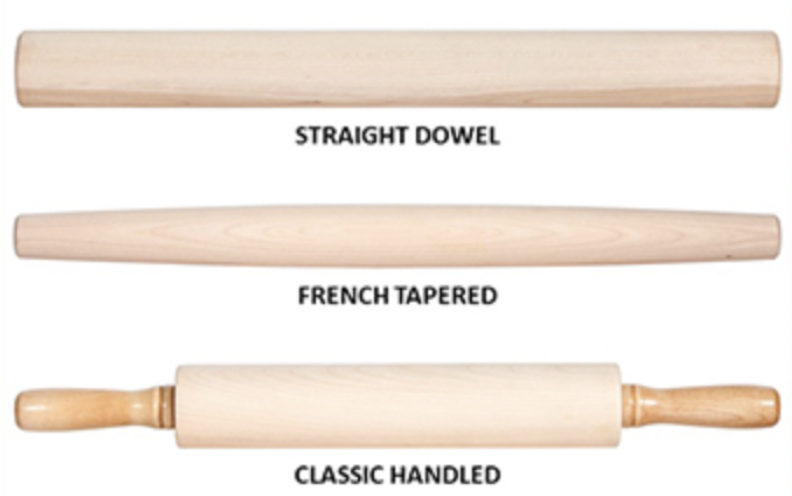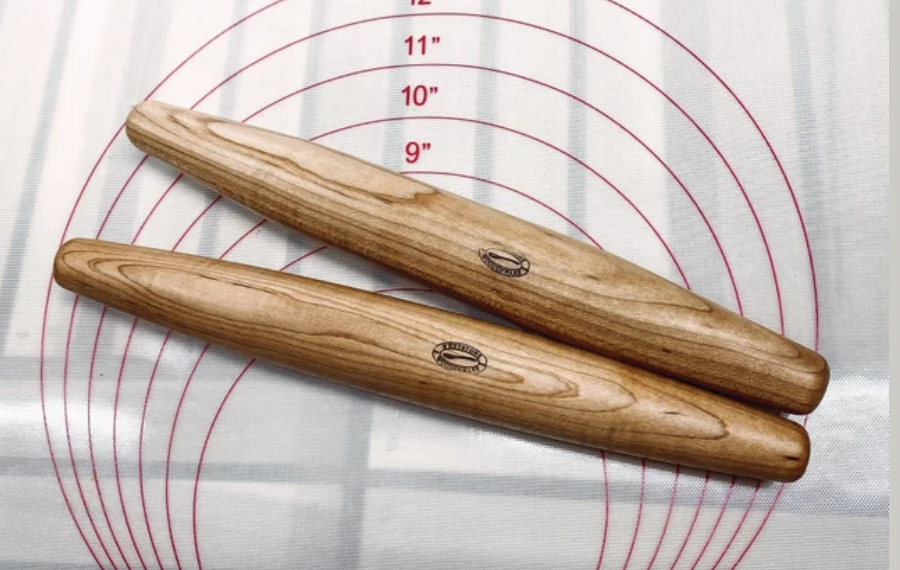How Do You Roll? Finding The Right Rolling Pin
By Chef David
Selecting the right rolling pin can be confusing. They come in a variety of shapes, materials, and seem equally suited to flatten. Honestly, I have been known to reach for a wine bottle when I need to roll dough or crush nuts. Sure, it works, but this is not the optimal solution. Although rolling pins are commonly associated with baking and dough, they can also be used to crush just about anything. By understanding the subtle differences in design, you pick a rolling pin that fits your cooking needs. Whatever you decide don’t compromise on comfort. Your rolling pin should not be too big or too heavy, it should be solid and comfortable to hold.
When you think of rolling pins, what comes to mind?
For some, the iconic rolling pin is what grandma used, wooden with handles on the end. But this is just one of two basic types. The subtle differences between the two types may seem confusing to the non-baker home-cook, by learning their purpose, you can determine which rolling pin is right for you.
- Tapered Rolling Pin, this French design makes this rolling pin easy to grip and is aesthetically pleasing. Tapered is considered best for rolling out pastries and doughs with yeast, which requires you to stretch and move the dough more aggressively. A pin that tapers gradually is recommended; this allows you to maintain constant contact with your dough.
- Straight Dowel Rolling Pin offers the maximum flat surface and allows you to apply constant pressure. They are recommended for cookie dough or other items which require even thickness, and they can be used for crushing ingredients. They tend to be thicker and heavier than tapered pins. Adding handles make the straight rolling pin easier to grip, making this a great choice for younger and older bakers alike.
Choice of Materials
Classic rolling pins are made from hardwood, but you can also find pins made of non-stick metal, silicon, or marble, even glass. When rolling out dough, sprinkle the pin with flour to prevent dough from sticking; this is where a silicon pins’ non-stick quality may be an advantage. Wooden pins are better at holding flour than metal and marble pins which are colder or can be chilled, making it less likely for butter to melt during the rolling process. The material alone should not be your only consideration. Look at the weight of the rolling pin, lighter rolling pins makes them easier to use.
A wooden pin should be maintained like a wooden cutting board. Scrape off the dough and wipe it down with a cloth after each use. Don’t leave a wooden rolling pin submerged in water or put it in a dishwasher. If you have an unfinished rolling pin, you will want to treat it with oil. After the pin is clean and dry, put a drop of mineral oil on a soft cloth and lightly coat the rolling pin. With proper care, a wooden rolling pin can last for generations.
Two Brands to Consider
As a purist, I prefer traditional wooden rolling pins, they are light, and inexpensive, even for high-quality handcrafted pins. Like my wooden cutting board, they add flair and authenticity to the kitchen. I am not an avid baker, so my rolling pin does not get used heavily, I use it for baking cookies, hamantaschen, and rolling dough.
Fletcher Mills subsidiary of Maine Wood Concepts
Fletcher Mills has a reputation for producing high-quality maple wooden rolling pins, in addition to making salt and pepper mills. Their products are proudly “Made in the USA” at a factory in Maine. They are environmentally conscious, using wood that was sustainably harvested, they even recycle the sawdust and scrap wood. They support the local economy by working with local loggers to produce boards. As Doug Fletcher likes to say “From raw logs to the finished product the entire process is done in-house and under a watchful eye. That is why the Fletchers are proud to say Made in Maine, Guaranteed for Life.”
The story of how their business began is the American dream. Brothers Wayne and Earl Fletcher wanted to own a business. In 1971, they mortgaged their homes to buy an antiquated wood mill which they used for making wooden nickels, tool handles, and toy parts. Since 1994 Wayne’s sons Doug, Gary, and Jody have owned and operated the business, and 50 years later, Maine Wood Concepts is still family-owned and managed by Jody Fletcher.
Fletcher Mills makes a wide variety of rock maple rolling pins, including a classic rolling pin with handles in 10-inch, 12-inch, 15-inch, 18-inch, and a children’s pin which is 7-inch. They also make a straight dowel bakery rolling pin, a wider width pin for tortillas, and a French Rolling pin. Their French rolling pin is 20-inch long, lightweight, and gently tapered, designed for rolling out perfect circles due to its small diameter.
Fletcher Mills rolling pins are well made. I found the French Rolling pin easy to use, making it an attractive alternative to the traditional rolling pin your grandmother used. Look at their website and marvel at the wide variety of wooden products, including mills and shakers.
Whetstone Woodenware is another highly respected family brand. They are located in Silver Lake Indiana and have been producing handmade wooden spoons, ladles, rolling pins, bowls, breadboards, and so much more, since 1991. Owner, Sam Whetstone, recounts how the business was born in 1978 when his father, John, set out to make his wife a wooden spoon that would not break. Using a handmade band saw and antique wood lathe he did just that. John Whetstone opened a woodworking business The Carpenter Shop in 1984 designing custom furniture and making wooden spoons. In 1991 Whetstone Woodenware was created, making kiln-dried hard maple grown and milled in the USA.
John passed the baton to Sam who continues to produce custom workmanship, with fine handmade products. Their French rolling pins are 2-inch in diameter, they come in four sizes, 11-inch, 14-inch, 19-inch, and 23-inch. Whetstone also makes both a light and a heavy rolling pin with handles, and a children’s rolling pin, traditional dowel-shaped pastry rolling pins, and less traditional Oriental rolling homemade egg rolls or dumpling dough (a straight dowel with a wider diameter).
I felt the French rolling pin from Whetstone Woodenware provides the ideal all-purpose pin. It has a large straight length which provides a nice flat working surface. The 19-inch version has a 9-inch flat area between the tapered handles. This rolling pin works well for both cookies and pies.
Whetstone Woodenware produces a wide range of handcrafted wooden items, including wooden spoons.
Something Special for that Special Someone
For cooks who bake infrequently, a rolling pin may not be a kitchen essential, instead, it can be a welcome upgrade.
While hand-me-down pins are functional, they may not the most efficient pin for the job. Consider an upgrade to a French rolling pin, I did. I discovered they are easier to handle and lighter to use, not to mention being an elegant kitchen addition. Perfect for a splurge, or a gift. Handmade wooden rolling pins look expensive, but they are affordable, typically priced at under $30. Wooden rolling pins are made to last a lifetime, they can become a legacy kitchen item for the next generation of family chefs.









